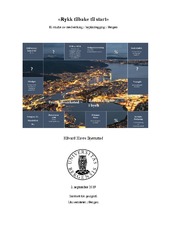Rykk tilbake til start - ei studie av medverking i byplanlegging i Bergen
Master thesis
Permanent lenke
https://hdl.handle.net/1956/20915Utgivelsesdato
2019-10-09Metadata
Vis full innførselSamlinger
- Department of Geography [634]
Sammendrag
Når byar skal planleggast har kommunen ansvar for å sjå til at medverking er lagt til rette for, anten det er private eller offentlege planforslag. I fylgje plan- og bygningslova skal det leggast ut til høyring og offentleg ettersyn. I slike høyringsrundar visar det seg fort at det hovudsakleg er eigedomsutviklarar, juristar og arkitektar som svarar og i den grad det er andre, så gjeld svara ofte eigen eigendom. Dei siste åra har ein likevel sett eit auka fokus på aktiv medverking frå befolkninga generelt, og det er nettopp dette oppgåva dreiar seg om. Dette avdi det i forsøka på aktiv medverking er grupper som fell utanfor og ikkje deltek i planlegginga og utforminga av rommet dei oppheld seg i. Dette har gjort at denne oppgåva rettar søkjeljoset på korleis ein kan få med ein større del av befolkninga i planleggingsprosessar. For å freista å finna ut av dette har dei teoretiske omgrepa og retningane sosial ekskludering, retten til byen og rettferd og kommunikativ planlegging vorte tatt i bruk. I tillegg til dette har det vorte utvikla eit brettspel for å finna ut om dette kan fungera som ein arena for medverking og diskusjon. Det er difor òg vist til teori kring alvorlege spel og spelifisering. Denne oppgåva viser korleis offentlege myndigheiter legg til rette for medverking, kva for moglege barriere som eksisterer mot det å aktivt delta og korleis spel kan nyttast i utforminga av urban politikk. Det vert òg vist til potensielle fylgjer ei medverking utover minstekravet i planog bygningslova kan føre til. Med andre ord vert det argumentert for meir medverking frå ulike grupper i samfunnet og gjerne med bruk av lystbetonte metodar. I tillegg vert det argumentert for at ein er nøydd å oppsøkje dei gruppene som ikkje allereie deltek i planleggingsprosessar. When planning a city, the municipality has a responsibility to ensure the public participation is facilitated, whether it is private or public planning proposals. In accordance with «plan- og bygningslova», public consultation and inspection has to be submitted. In such rounds, it is apparent that the main actors that respond are property developers, lawyers and architects, and to the extent there are others who respond, it is most frequently about their own property. However, in recent years, there has been an increased focus on more active participation in planning, which is the topic in this thesis. As there still are groups not reached in the attempt to get more active participation, hence they do not participate in the planning and design of urban space. This has led this thesis to examine how to get a bigger portion of the population to participate in the planning processes. In an attempt to grasp this, the theoretical outlines and directions that has been used are theories on social exclusion, the right to the city – coupled with theories on justice, and communicative planning. In addition to this, a board game has been developed, to see if this can serve as a possible arena for participation and discussion. This thesis shows how public authorities facilitate participation, what kind of barriers that exists to actively participate and how games can be useful in the shaping of urban politics. It is also shown some potential outcomes if one exceeds the minimum requirement in «plan- og bygningslova». In other words, it is argued for greater participation from various groups in society and the use of methods that are fun when doing so. In addition to this, it is argued that it is necessary to seek out groups that do not already participate in planning processes.
